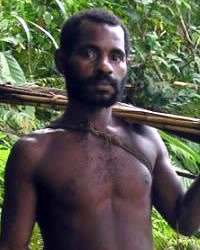Andai in Papua New Guinea

Photo Source:
Anonymous
|
Send Joshua Project a map of this people group.
|
| People Name: | Andai |
| Country: | Papua New Guinea |
| 10/40 Window: | No |
| Population: | 500 |
| World Population: | 500 |
| Primary Language: | Andai |
| Primary Religion: | Ethnic Religions |
| Christian Adherents: | 15.00 % |
| Evangelicals: | 2.00 % |
| Scripture: | Translation Started |
| Ministry Resources: | No |
| Jesus Film: | No |
| Audio Recordings: | No |
| People Cluster: | New Guinea |
| Affinity Bloc: | Pacific Islanders |
| Progress Level: |
|
Introduction / History
The Andai people live in the mountains of the East Sepik Province, Papua New Guinea. Their staple food is sago. They process the trunk of the sago palm to make a flour which is subsequently mixed with a little water and cooked over the fire into dry, pancake-shaped loaves. The Andai people also eat green leafy vegetables and occasionally hunt for animals such as tree kangaroo and snake.
The need to collect sago sometimes leads the Andai people to leave their villages for weeks at a time because the sago palms grow far away from their villages. While they are processing sago, Andai families live in temporary shelters in small bush camps. They also cultivate some produce in small gardens, although reportedly gardening is not part of their traditional culture.
The Andai people primarily speak their vernacular language, also called Andai. Although some people also speak Tok Pisin, which is one of the trade languages of Papua New Guinea, proficiency in Tok Pisin is limited. Many women do not speak more than a few basic words of Tok Pisin.
Despite trends of modernization in Papua New Guinea, the Andai people hold on to their traditional way of life. They hunt with bow and arrows, construct their houses from materials derived from the palm tree, travel in dugout canoes, and some, especially men and boys, wear traditional clothing.
What Are Their Beliefs?
In 1982 the first Lutheran church was planted in the Andai area. The Lutheran church has both local leadership and foreign missionaries working amongst the Andai. While most people in the area profess Christianity, there appears to be much nominalism and, although it is not always admitted openly, it seems that traditional spiritual practices are common. Sorcery, divination and magic are still practiced.
There is no Scripture written in the Andai language, and many people cannot understand the Bible well in any other language. There is a need for God's Word to be translated into Andai. Since many Andai people have never been to school, they will need significant outside assistance in translating the Bible.